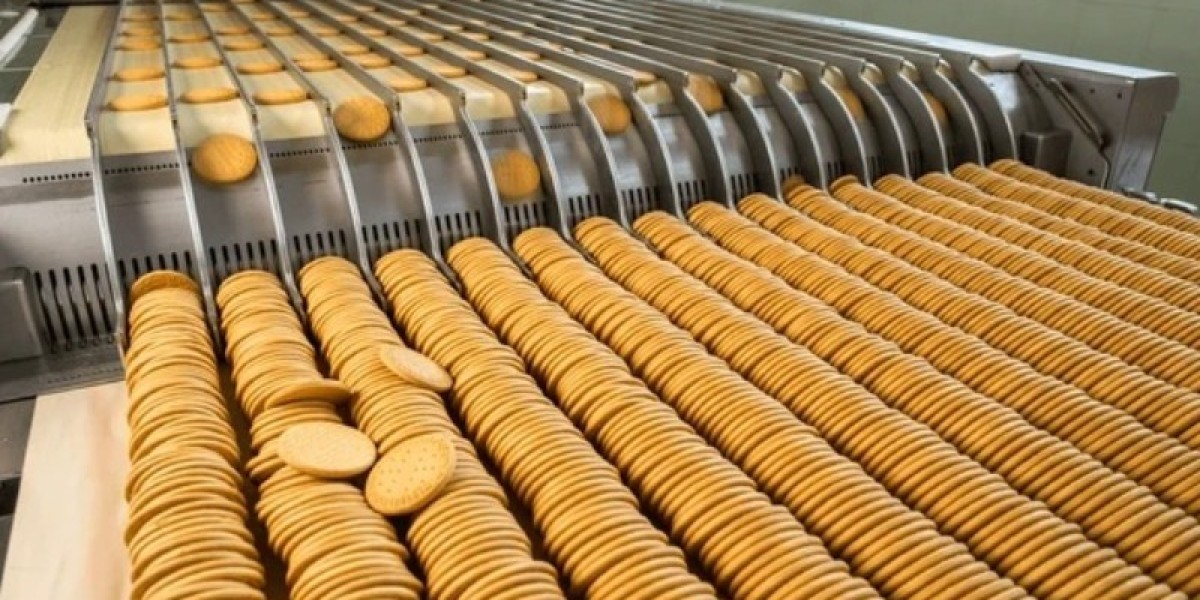Boost your bakery production with advanced biscuit making machines from TimesAutomation. Designed for efficiency, consistency, and hygiene, these machines automate dough mixing, shaping, baking, and cooling. Ideal for producing soft, hard, or cream-filled biscuits, they reduce labor, minimize waste, and ensure uniform quality. Upgrade your production line and enhance profitability with our reliable biscuit making machines.
What Is a Biscuit Making Machine?
A biscuit making machine is an industrial piece of equipment designed to automate the process of producing biscuits, cookies, and other baked goods. Unlike traditional manual methods, these machines handle everything from dough mixing, rolling, cutting, shaping, to baking, cooling, and packaging.
Modern biscuit making machines are often made with food-grade stainless steel, equipped with programmable controls, and integrated with advanced features like adjustable speed, temperature control, and automated feeding systems. This ensures consistent output, minimal manual intervention, and high-quality production.
Why Food Manufacturers Are Embracing Automated Biscuit Making Machines
1. Enhanced Production Efficiency
One of the primary advantages of a biscuit making machine is its ability to produce large quantities in a short time. Automated machines can operate continuously, reducing downtime and allowing manufacturers to meet high demand efficiently. By streamlining the entire production line, these machines save both time and labor, boosting overall productivity.
2. Consistent Quality and Uniformity
Consistency is key in the food industry. Manual production often leads to variations in biscuit size, shape, and texture. Automated biscuit making machines eliminate these inconsistencies by ensuring precise dough handling, shaping, and baking. This guarantees uniform quality, which is crucial for brand reputation and customer satisfaction.
3. Labor Savings and Cost Efficiency
Labor costs are a significant part of bakery operations. By automating repetitive tasks, a biscuit making machine reduces the need for manual labor, allowing staff to focus on quality control, packaging, and innovation. Over time, this not only reduces operational costs but also improves workplace safety by minimizing human errors.
4. Hygienic and Food-Safe Production
Food safety regulations are stringent, and manufacturers cannot compromise on hygiene. Most modern biscuit making machines are constructed with stainless steel and other food-grade materials, which are easy to clean and resistant to contamination. Features like enclosed dough mixers, automated feeders, and CIP (Clean-in-Place) systems ensure that the production environment remains sanitary.
5. Flexibility in Production
Automated biscuit making machines offer versatility, allowing manufacturers to produce a wide variety of biscuits—hard, soft, cream-filled, or designer shapes—on the same machine. This flexibility enables businesses to diversify their product line and cater to changing consumer preferences without significant additional investment.
6. Reduced Waste
Manual production often results in dough wastage and inconsistent baking. Automated systems optimize material usage and ensure precise portioning, reducing raw material loss. This not only lowers production costs but also contributes to more sustainable manufacturing practices.
7. Integration with Modern Production Lines
A modern biscuit making machine can be integrated seamlessly into a fully automated production line, including dough preparation, baking, cooling, packaging, and labeling. This connectivity ensures a smooth workflow, minimizes bottlenecks, and enhances overall operational efficiency.
Key Features to Look for in a Biscuit Making Machine
When investing in a biscuit making machine, manufacturers should consider the following features:
Adjustable Speed and Temperature Controls: Ensure optimal baking for different biscuit types.
Programmable Logic Controls (PLC): Allow customization of production settings for quality and efficiency.
Automated Dough Handling: Reduces manual labor and ensures uniform portions.
Easy Cleaning and Maintenance: Stainless steel construction and CIP compatibility enhance hygiene.
Multi-Functionality: Ability to produce a variety of biscuit shapes, textures, and fillings.
Applications Across the Food Industry
Automated biscuit making machines are used in:
Large Bakeries: Producing thousands of biscuits daily with uniform quality.
Confectionery Factories: Making specialty biscuits, cookies, and chocolate-filled treats.
Small and Medium Enterprises (SMEs): Compact machines designed for smaller production scales but with automation advantages.
Food Service Providers: Supplying ready-to-pack biscuits for hotels, restaurants, and catering services.
Conclusion
The demand for high-quality, consistent, and efficiently produced biscuits has never been higher. A biscuit making machine addresses these challenges by automating production, reducing labor costs, ensuring hygiene, and maintaining consistent quality.






